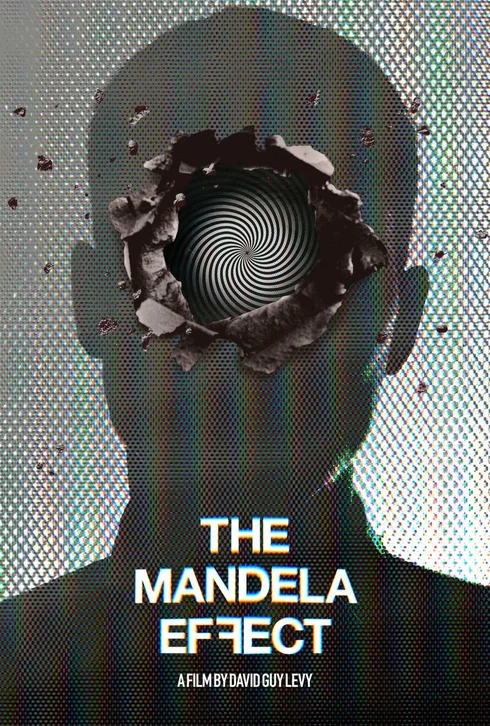🎯 Quick Overview
Trailer
- Director: David Guy Levy
- Genre: Drama, Horror, Sci-Fi, Thriller
- Release year: 2019
- Runtime (length): 1h 19min
- IMDb rating: 5.8/10 (5.3K votes)
- Rotten Tomatoes: 55% (Audience Score)
😅 Plot Summary – Badly Explained
A grieving dad learns his favorite childhood bears were always spelled ‘Berenstain,’ decides reality is broken, and tries to hack the universe back to normal using a quantum computer like it’s a video game.
🍿 The Mandela Effect: Detailed Plot Synopsis
Grief and a Strange Discovery
Computer game designer Brendan and his wife, Claire, are struggling to cope with the tragic drowning death of their young daughter, Sam. While going through Sam’s belongings, Brendan finds a copy of ‘The Berenstain Bears’ book. Both he and his brother-in-law vividly remember the title as ‘Berenstein Bears,’ leading them down a rabbit hole of collectively misremembered facts known as the Mandela Effect.

Deep Dive into the Unexplained
Obsessed with these discrepancies, Brendan begins researching the Mandela Effect, discovering many other examples like the tail (or lack thereof) on Curious George. He becomes convinced these aren’t just false memories but evidence of shifts between parallel universes. Desperate, he seeks out Dr. Roland Fuchs, a discredited scientist who believes the universe is a computer simulation, with the Mandela Effect being glitches or corrections in the code.

Planning to Break Reality
Dr. Fuchs’s theory suggests the Mandela Effect occurs when the simulation rewrites reality to prevent inhabitants from discovering its true nature. Believing his daughter Sam might still exist in an alternate version of reality, Brendan collaborates with Dr. Fuchs to develop a program designed to interrupt the simulation using a quantum computer. This pursuit strains his marriage and grasp on reality.

⚠️ Spoilers and Ending Explained
🎬 Cast & Characters
- Brendan (Charlie Hofheimer): The grieving father who becomes obsessed with the Mandela Effect, believing it is evidence of a simulated reality he can manipulate.
- Claire (Aleksa Palladino): Brendan’s wife, also grieving for their daughter, who becomes increasingly concerned by Brendan’s fixation on the Mandela Effect.
- Matt (Robin Lord Taylor): Brendan’s brother-in-law, who experiences some Mandela Effects but remains skeptical of Brendan’s elaborate theories.
- Dr. Fuchs (Clarke Peters): An ostracized scientist whose research into reality as a computer simulation aligns with Brendan’s discoveries about the Mandela Effect.
- Sam (Madeleine McGraw): Brendan and Claire’s daughter whose tragic drowning event is the catalyst for Brendan’s investigation into changing reality.
💬 Memorable Quotes
- Brendan: “How many? How many trials will it take for this rat to run this maze without making any mistakes?” – The film’s opening narration, setting a thematic tone about repetitive cycles, learning, and control.
- Brendan: “It’s not just misremembering. It’s… evidence.” – Said to his wife, Claire, as he begins to grapple with the unsettling nature of the collective ‘false’ memories he is discovering.
- Dr. Fuchs: “The Mandela Effect isn’t a glitch in memory. It’s a glitch in the code.” – Explaining his theory to Brendan that the collective discrepancies are evidence of living in a computer simulation.
- Brendan: “I think… I think we can change it.” – Stating his belief that he can manipulate the simulation to restore reality or bring back his daughter.
💰Box Office
- Budget: N/A
- Domestic Gross: N/A
- Worldwide Gross: N/A
💥 The Mandela Effect Reviews
Personal Review
Okay, so I went into this knowing about the whole Mandela Effect thing, and wow, this movie takes it to a wild place! I was totally hooked when he starts noticing the Berenstain Bears thing and then the Curious George doll. It really made me think about those weird memory quirks we all have. The movie does a great job of showing how his grief twists into this obsession, and I felt genuinely unnerved when reality starts getting glitchy for him. That scene where he finds out about Dr. Fuchs felt genuinely chilling. Yeah, it’s low-budget and maybe the ‘hacking the matrix’ part felt a bit simple, but the emotional core and the mind-bending questions it raises stuck with me long after it ended. I recommend it if you like sci-fi that makes you think and isn’t afraid to get a little weird.
- Who would enjoy:
- “Fans of philosophical or psychological science fiction”
- “Viewers interested in the Mandela Effect phenomenon”
- “Those who enjoy independent, low-budget sci-fi films that prioritize ideas”
- “People who like movies about simulation theory or parallel realities”
- “Audiences looking for a drama exploring grief through a sci-fi lens”
- Content warnings ⚠:
- “Deals with the death of a child and themes of grief”
- “Exploration of potentially unsettling concepts like questioning reality”
- “One instance of strong language (F-bomb)”
Professional Reviews
- Inspired by user review titled ‘Realistic thriller weaves actual Mandela Effect examples into sci-fi plot’: “This indie sci-fi delves into the Mandela Effect through the eyes of a grieving father. Charlie Hofheimer effectively conveys his character’s spiraling obsession and emotional turmoil. While low-budget constraints are evident, the film smartly incorporates real-world examples and theories, presenting a thought-provoking narrative about memory, loss, and the nature of reality. It’s a conversation starter that rewards viewers open to exploring metaphysical concepts within a grounded, human story.
- Inspired by user review titled ‘An Uninteresting Take on an Intriguing Subject’: “Despite an intriguing premise centered on the Mandela Effect, this film struggles to deliver a compelling experience. Decent performances from the cast, particularly Charlie Hofheimer and glimpses of Clarke Peters, can’t overcome a script that feels underdeveloped. It touches on fascinating ideas like simulation theory but ultimately drags, failing to build meaningful suspense or provide satisfying insight into its chosen phenomenon. The ending, while aiming for profundity, feels rushed and ultimately underwhelming.
Audience Reactions
Many viewers found the film’s exploration of the Mandela Effect and simulation theory genuinely thought-provoking.: The movie’s concept and willingness to tackle complex, speculative ideas like reality being a simulation or glitching between dimensions are frequently praised by fans of philosophical sci-fi.
Overall Consensus: A polarizing indie sci-fi that is either a thought-provoking, understated exploration of fascinating concepts and grief for those open to its ideas, or a slow, underdeveloped drama that fails to fully capitalize on its intriguing premise for those seeking more conventional sci-fi thrills or scientific rigor.
Awards
🛠️ Behind the Scenes
- “Clarke Peters, who portrays Dr. Roland Fuchs, previously played Nelson Mandela in the film ‘Endgame’ (2009), connecting the actor to the namesake of the film’s central phenomenon.”
- “In one scene, Brendan seems to introduce himself as ‘Brandon’ before being corrected to ‘Brendan’ by Dr. Fuchs, a detail that some interpret as an intentional subtle nod to the film’s theme of shifting reality or memory glitches rather than a simple goof.”
- “The film was made on a relatively low budget, relying heavily on its conceptual premise and the central mystery rather than extensive special effects.”
- “Director David Guy Levy included accurate representations of computer science concepts, such as realistic Linux terminal interactions and scripting scenes, appealing to viewers with a technical background.”
🖥️ How to Watch The Mandela Effect?
Finding ‘The Mandela Effect’ movie (2019) may require checking various video-on-demand (VOD) platforms. As a niche independent film, it is often available for rental or purchase on digital storefronts such as Prime Video, Apple TV, Google Play, and Vudu. Availability on subscription streaming services can vary over time. Check your preferred platform for current options.

🎥 Similar Movies
If you enjoyed The Mandela Effect, you might like these similar films:
- The Matrix (1999): Both films explore the concept of reality being a computer simulation and feature protagonists who discover the truth and attempt to rebel against it, questioning the nature of existence.
- Coherence (2013): This indie sci-fi film similarly uses a contained, low-budget setting to explore complex themes of parallel realities and quantum mechanics, focusing on how characters react when their reality shifts.
- Primer (2004): A quintessential low-budget, high-concept cult classic sci-fi film known for its intellectual complexity and hard science approach to reality manipulation, appealing to viewers who enjoy challenging narratives.
- Dark City (1998): Explores themes of altered reality, manipulated memories, and a protagonist discovering the true nature of his world, which is secretly controlled by external forces.
- Syncronic (2019): Released in the same year, this film also deals with altered states of reality and time, rooted in a scientific concept that disrupts the characters’ understanding of their world.
🛒 The Mandela Effect Related Products
- The Reality Illusion: How the News, Entertainment, and Social Media Manipulate the Truth: A deep dive into cognitive biases, shared false memories, and the ways information (or misinformation) shapes our collective perception of reality.
- Are We Living in a Computer Simulation?: A concise, accessible exploration of the simulation hypothesis, a philosophical argument suggesting our reality is an artificial simulation.
- The Matrix Trilogy (4K UHD): The iconic film series exploring a reality that is secretly a computer simulation run by machines.
- The Mandela Effect Movie Poster: Official movie poster art featuring key imagery and themes from the film.
🎧 Soundtrack
The Mandela Effect features a captivating soundtrack that enhances the movie’s atmosphere and emotional impact. Here are some notable tracks:
- “The Weight of Memory” – performed by Film Score Ensemble
- “Reality Distortion Loop” – performed by Cinematic Sound Designers
- “The Simulation Hypothesis” – performed by Mystery Score Collective
- “Echoes of Another Time” – performed by Orchestral Themes Group
You can find the complete soundtrack on Amazon Music and Apple Music.
🤨 FAQ
The movie explores the real-world psychological phenomenon where large groups of people share clear, but false, memories of past events or facts. Examples featured include remembering the ‘Berenstein Bears’ instead of ‘Berenstain Bears’ and recalling Curious George having a tail when he doesn’t.
While the movie is based on the real-world psychological phenomenon known as the Mandela Effect, the specific plot involving parallel universes, computer simulations, and the main character’s journey is fictional.
The movie presents a fictional explanation through the character of Dr. Fuchs, who posits that the universe is a sophisticated computer simulation. The Mandela Effect, in this context, is theorized to be glitches or conscious corrections made by the simulation’s operators to maintain stability or prevent detection.
At the end (spoiler alert), the protagonist Brendan manages to crash the simulation of reality. It then reboots, sending him back in time just before his daughter’s accident. By making a small change (preventing her from taking her doll near the water), he saves her life, effectively creating a new timeline within the simulation where the triggering event never occurred.
The film stars Charlie Hofheimer as the lead character Brendan, Aleksa Palladino as his wife Claire, and Robin Lord Taylor as his brother-in-law Matt. Clarke Peters plays the scientist Dr. Roland Fuchs.
🔥 Bonus Content
How scary is the Mandela effect? Why do people’s memories change at the same time?1/2
Curious about what happens in ‘The Mandela Effect’ movie and how it explores the bizarre phenomenon? This quick explanation breaks down the core idea and plot – it’s fascinating how it visualizes reality getting wobbly!
✨ Rate
There are no reviews yet. Be the first one to write one.





